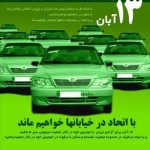NEW Latest Iran Video: The Shiraz Protest Against Ahmadinejad (12 October)NEW Video: Protest at Tehran Azad University (13 October)Iran: The Politics of the Death SentencesThe Latest from Iran (12 October): Green Shoots?Receive our latest updates by email or RSS SUBSCRIBE TO OUR FEEDBuy Us A Cup of Coffee? Help Enduring America Expand Its Coverage and Analysis
1915 GMT: The Internet is buzzing over the story that Narges Kalhor, the daughter of President Ahmadinejad's advisor for cultural and media affairs,
has applied for asylum in Germany. Kalhor made the application after showing her film
The Rake at the International Human Rights Film Festival in Nuremberg. The movie condemns the use of torture in Iranian prisons and the totalitarianism of Iran's authorities.
The filmmaker Hana Makhmalbaf has conducted
a video interview with Kalhor.
1810 GMT: Everyone's
piling in to mention the Iranian Government's threat to prosecute Mehdi Karroubi for "lies" about the abuse of detainees. Iran's Prosecutor General Gholam-Hossein Mohseni-Ejeie has
added to the earlier warnings from his Tehran counterpart, Abbas Jafari Doulatabadi: "They [Clerical Court] have been tasked with hearing cases raised against the clergy and [you can] be sure that they will deal with this issue."
1700 GMT: We've posted
a set of videos from today's protests by students at Tehran Azad University.
1625 GMT: Yes, A Rafsanjani Signal. EA's Mr Smith checks in to tell us that the interview with Hossein Mar'ashi of the Kargozaran party is even more significant than we thought (1000 GMT):
Mar'ashi is a close relative of Rafsanjani and served as his point man in the Khatami administration (1997-2005). The full text of the interview was published on the youth wing website of Kargozaran, and they explained that the interview had been previously published in censored form by the Etemaad daily due to "heavy pressures". One can surmise that it was Rafsanjani that gave the green light to the publication of the full text to send the message that he is aware of what's going on in the country.
The most significant snippet of the interview is the part in which Mar'ashi states that the regime wishes to have Hashemi "fall on his knees" and they want to make a "Jannati out of him", alluding to the puppet-like stance of the head of the Guardian Council [Ayatollah Jannati] vis-a-vis Ahmadinejad and the Supreme Leader. He also claimed that "senior leaders" of the IRGC want to arrest the reformist leaders.
1615 GMT: Fereshteh Ghazi has posted another set of information about
the latest condition of detainees.
1600 GMT: Back from an afternoon of teaching with some most interesting inside information. An EA source with excellent links inside Iran tells us of President Ahmadinejad's trip to Shiraz yesterday.
The vast majority of students who turned out protested against the visit, in which Ahmadinejad reportedly arrived late and left early.
At the same time, Ayatollah Dastgheib, a vocal critic of the Government, gave an important speech to a small audience. The speech has not yet been published but, according to the source's information, Dastgheib went even further in his questioning of the legitimacy of Ahmadinejad's authority and also challenged the position of the Supreme Leader.
1145 GMT: No Worries About Corruption/Mismanagement Allegations? Really? This is
the current lead story on the Islamic Republic News Agency website: "Not even one rial [Iranian currency] of oil revenue has been lost. The Ahmadinejad Government is a clean government." The claim comes from a "parliamentary deputy" on the Supreme Audit Court.
1100 GMT: Turning Up the Pressure.
Here's the regime response to Mehdi Karroubi's recent renewal of his claims -- expressed through the letter sent by his son to the head of Iranian state broadcasting and his Saturday meeting with Mir Hossein Mousavi --- on abuses of detainees and, more broadly, flaws and injustices in the system. Tehran's Prosecutor-General, Abbas Jafari Dolatabadi, has said that a special clerical court is leading an enquiry into whether Karroubi broke the law when he accused security forces of rape and other abuses. (English-language summary available
via the Los Angeles Times)
This is not yet a prosecution, more of a "final final warning". EA readers will recall last month when Ali Larijani was despatched, probably by the Supreme Leader, to tell Karroubi to maintain a low-profile silence and when the Government raided Karroubi's offices. Karroubi still joined the Qods Days marches, and his renewed statements have been matched by a restored Web presence.
So the ball is back in Karroubi's court but I fully expect him to play another shot. Game on.
1000 GMT: A Rafsanjani Signal? Hossein Mar'ashi, a high-level official in the Kargozaran party,
has said: "Today I believe devoutly that this trueborn way which is presented by Mr. [Mir Hosssein] Mousavi as the "Green Path of Hope", implemented by the ...people in the framework of a movement. The power establishment cannot stand against it in the long-term neither structurally nor legally and has to accept the people's will sooner or later."
Kargozaran has been linked to Hashemi Rafsanjani since its formation in the 1990s, though it is a matter for discussion whether he is associated with this latest move. The Facebook site associated with Zahra Rahnavard, Mousavi's wife,
is hopeful, calling the party "close to Rafsanjani".
0945 GMT: So What is This "Ground Resistance Force"? It's a genuine question, as we can't quite get our hands around the significance of
this declaration by the head of Iran's armed forces, Major General Hassan Firouzabadi:
After two years of study we decided to change the IRGC [Islamic Revolution Guard Corps]’s structure, for the Basij to work in areas such as software work and the propagation of the Basiji culture in society, and to delegate the tasks, duties and mobilization of Basij units to a new called the IRGC Ground Resistance in order to increase expertise among the units.
The easy read is of a merger of the Basiji militia into the military organisation, but what does mean in terms of the control of those forces? Is this an effective IRGC expansion of authority, accompanying the possibility of its widening political influence? And, in the short term, what does this means for operations against the Green opposition and other demonstrators?
0615 GMT: Little breaking news out of Iran so far today.
The New York Times runs instead
a context article on "dozens of reporters, photographers and bloggers who have either fled Iran or are trying to flee in the aftermath of the disputed June presidential election", featuring interviews with two of the photographers, one who is still in the country.
Mowj-e-Sabz looks forward to the 4 November demonstrations, "reminding the coup government that the issue of the elections is far from over".
Arguably, the most significant development on Monday was the
Parliamentary passage of Government cuts in subsidies for energy and food. (Subscription required, but the full article can be accessed via Google Search using title and author.) Of course, the action risks public opposition, particularly as President Ahmadinejad has based his electoral appeal on helping the lower classes of Iran, but as the Minister of Economy told Parliament, "Under the current circumstances about a third of the country's income is directly or indirectly paid in subsidies," the cost of which has risen to $100 billion/year.
Is the Government on rocky economic ground that could cause political shifts? Far too soon to tell, of course, but a sign of nerves comes in Press TV's coverage. Ignoring the subsidy story this morning, its website prefers the reassurance of
a natural gas deal between Switzerland and Iran.
EA readers have been paying attention to the economic aspects of the current crisis for several days, including
a telling exchange last night, "Why people are taking it so much?" Iran specialists with whom I have been corresponding believe that the initial cuts in subsidies are manageable --- for example, households still get the full discount on purchases to fuel to a certian level, and then pay a "full price" which is amongst the cheapest in the world. However, there may be a cumulative effect. Add the Government measures to non-payment of wages in certain sectors and, in particular cases, strikes.
Despite the quiet, the situation is far from settled, and money and politics could be a combustible mix.
 Wednesday, October 14, 2009 at 8:23
Wednesday, October 14, 2009 at 8:23  Der Spiegel claims that US forces deployed in the Gulf of Suez discovered containers of ammunition carried from Iran to Syria by a Hamburg-based shipping company, Leonhardt & Blumberg. American officials said the arms shipment is a violation of UN Security Resolution 1747, which forbids all weapons shipments into and out of Iran.
Der Spiegel claims that US forces deployed in the Gulf of Suez discovered containers of ammunition carried from Iran to Syria by a Hamburg-based shipping company, Leonhardt & Blumberg. American officials said the arms shipment is a violation of UN Security Resolution 1747, which forbids all weapons shipments into and out of Iran. Der Spiegel claims that US forces deployed in the Gulf of Suez discovered containers of ammunition carried from Iran to Syria by a Hamburg-based shipping company, Leonhardt & Blumberg. American officials said the arms shipment is a violation of UN Security Resolution 1747, which forbids all weapons shipments into and out of Iran.
Der Spiegel claims that US forces deployed in the Gulf of Suez discovered containers of ammunition carried from Iran to Syria by a Hamburg-based shipping company, Leonhardt & Blumberg. American officials said the arms shipment is a violation of UN Security Resolution 1747, which forbids all weapons shipments into and out of Iran.
 1915 GMT: The Internet is buzzing over the story that Narges Kalhor, the daughter of President Ahmadinejad's advisor for cultural and media affairs,
1915 GMT: The Internet is buzzing over the story that Narges Kalhor, the daughter of President Ahmadinejad's advisor for cultural and media affairs,  1930 GMT: The reformist Assembly of Combatant Clergymen, paralleling the statements of Mohammad Khatami,
1930 GMT: The reformist Assembly of Combatant Clergymen, paralleling the statements of Mohammad Khatami,